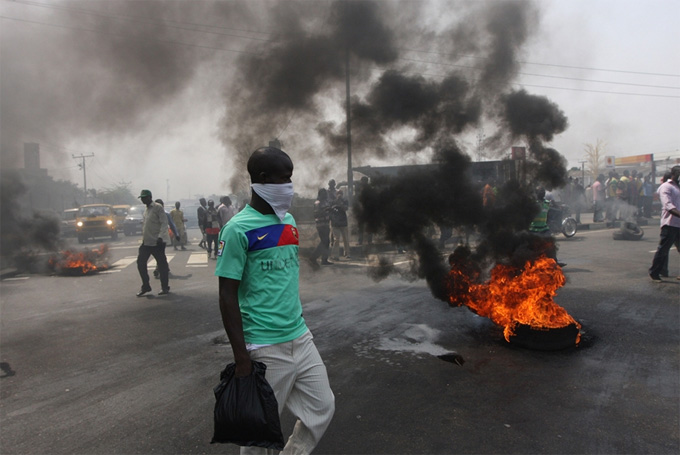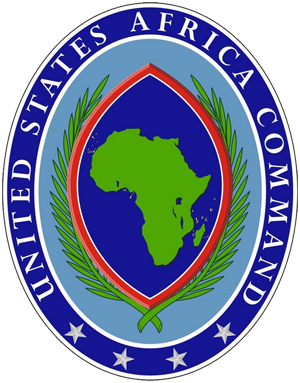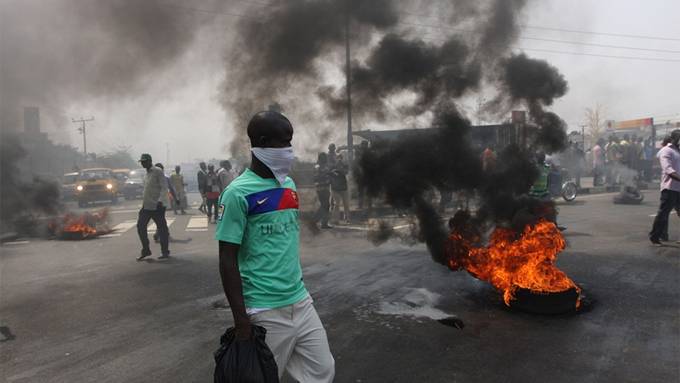Lagos Dissents Under IMF Hegemony - Nigeria: The Next Front for AFRICOM
Source: nilebowie.blogspot.com

On a recent trip to West Africa, the newlyappointed managing director of the International Monetary Fund, Christine Lagarde ordered the governments of Nigeria, Guinea, Cameroon, Ghana and Chad to relinquish vital fuel subsidies. Much to the dismay of the population of these nations, the prices of fuel and transport have near tripled over night without notice, causing widespread violence on the streets of the Nigerian capital of Abuja and its economic center, Lagos. Much like the IMF induced riots in Indonesia during the 1997 Asian Financial Crisis, public discontent in Nigeria is channelled towards an incompetent and self-serving domestic elite, compliant to the interests of fraudulent foreign institutions.
Although Nigeria holds the most proven oil reserves in Africa behind Libya, it’s people are now expected to pay a fee closer to what the average American pays for the cost of fuel, an exorbitant sum in contrast to its regional neighbours. Alternatively, other oil producing nations such as Venezuela, Kuwait and Saudi Arabia offer their populations fuel for as little as $0.12 USD per gallon. While Lagos has one of Africa’s highest concentration of billionaires, the vast majority of the population struggle daily on less than $2.00 USD. Amid a staggering 47% youth unemployment rate and thousands of annual deaths related to preventable diseases, the IMF has pulled the rug out from under a nation where safe drinking water is a luxury to around 80% of it’s populace.
Although Nigeria produces 2.4 million barrels of crude oil a day intended for export use, the country struggles with generating sufficient electrical power and maintaining its infrastructure. Ironically enough, less than 6% of bank depositors own 88% of all bank deposits in Nigeria. Goldman Sachs employees line its domestic government, in addition to the former Vice President of the World Bank, Ngozi Okonjo-Iweala, who is widely considered by many to be the de facto Prime Minister. Even after decades of producing lucrative oil exports, Nigeria has failed to maintain it’s own refineries, forcing it to illogically purchase oil imports from other nations.Society at large has not benefited from Nigeria’s natural riches, so it comes as no surprise that a severe level of distrust is held towards the government, who claims the fuel subsidy needs to be lifted in order to divert funds towards improving the quality of life within the country.
Like so many other nations, Nigerian people have suffered from a systematically reduced living standard after being subjected to the IMF’s Structural Adjustment Policies (SAP). Before a loan can be taken from the World Bank or IMF, a country must first follow strict economic policies, which include currency devaluation, lifting of trade tariffs, the removal of subsidies and detrimental budget cuts to critical public sector health and education services.
SAPs encourage borrower countries to focus on the production and export of domestic commodities and resources to increase foreign exchange, which can often be subject to dramatic fluctuations in value. Without the protection of price controls and an authentic currency rate, extreme inflation and poverty subsist to the point of civil unrest, as seen in a wide array of countries around the world (usually in former colonial protectorates). The people of Nigeria have been one of the world’s most vocal against IMF-induced austerity measures, student protests have been met with heavy handed repression since 1986 and several times since then, resulting in hundreds of civilian deaths. As a testament to the success of the loan, the average laborer in Nigeria earned 35% more in the 1970’s than he would of in 2012.
Working through the direct representation of Western Financial Institutions and the IMF in Nigeria’s Government, a new IMF conditionality calls for the creation of a Sovereign Wealth Fund. Olusegun Aganga, the former Nigerian Minister of Finance commented on how the SWF was hastily pushed through and enacted prior to the countries national elections. If huge savings are amassed from oil exports and austerity measures, one cannot realistically expect that these funds will be invested towards infrastructure development based on the current track record of the Nigerian Government. Further more, it is increasingly more likely that any proceeds from a SWF would be beneficial to Western institutions and markets, which initially demanded its creation. Nigerian philanthropist Bukar Usman prophetically writes “I have genuine fears that the SWF would serve us no better than other foreign-recommended "remedies" which we had implemented to our own detriment in the past or are being pushed to implement today.”
The abrupt simultaneous removal of fuel subsidies in several West African nations is a clear indication of who is really in charge of things in post-colonial Africa. The timing of its cushion-less implementation could not be any worse, Nigeria’s president Goodluck Jonathan recently declared a state of emergency after forty people were killed in a church bombing on Christmas day, an act allegedly committed by the Islamist separatist group, Boko Haram. The group advocates dividing the predominately Muslim northern states from the Christian southern states, a similar predicament to the recent division of Sudan.
 As the United States African Command (AFRICOM) begins to gain a foothold into the continent with its troops officially present in Eritrea and Uganda in an effort to maintain security and remove other theocratic religious groups such as the Lord’s Resistance Army, the sectarian violence in Nigeria provides a convenient pretext for military intervention in the continuing resource war. For further insight into this theory, it is interesting to note that United States Army War College in Carlisle, Pennsylvania conducted a series of African war game scenarios in preparation for the Pentagon’s expansion of AFRICOM under the Obama Administration.
As the United States African Command (AFRICOM) begins to gain a foothold into the continent with its troops officially present in Eritrea and Uganda in an effort to maintain security and remove other theocratic religious groups such as the Lord’s Resistance Army, the sectarian violence in Nigeria provides a convenient pretext for military intervention in the continuing resource war. For further insight into this theory, it is interesting to note that United States Army War College in Carlisle, Pennsylvania conducted a series of African war game scenarios in preparation for the Pentagon’s expansion of AFRICOM under the Obama Administration.In the presence of US State Department Officials, employees from The Rand Corporation and Israeli military personnel, a military exercise was undertaken which tested how AFRICOM would respond to a disintegrating Nigeria on the verge of collapse amidst civil war. The scenario envisioned rebel factions vying for control of the Niger Delta oil fields (the source of one of America’s top oil imports), which would potentially be secured by some 20,000 U.S. troops if a US-friendly coup failed to take place. At a press conference at the House Armed Services Committee on March 13, 2008, AFRICOM Commander, General William Ward then went on to brazenly state the priority issue of America’s growing dependence on African oil would be furthered by AFRICOM operating under the principle theatre-goal of “combating terrorism”.
At an AFRICOM Conference held at Fort McNair on February 18, 2008, Vice Admiral Robert T. Moeller openly declared the guiding principle of AFRICOM is to protect “the free flow of natural resources from Africa to the global market”, before citing China’s increasing presence in the region as challenging to American interests. After the unwarranted snatch-and-grab regime change conducted in Libya, nurturing economic destabilization, civil unrest and sectarian conflict in Nigeria is an ultimately tangible effort to secure Africa’s second largest oil reserves. During the pillage of Libya, its SFW accounts worth over 1.2 billion USD were frozen and essentially absorbed by Franco-Anglo-American powers; it would be realistic to assume that much the same would occur if Nigeria failed to comply with Western interests.While agents of foreign capital have already infiltrated its government, there is little doubt that Nigeria will become a new front in the War on Terror.
Source: nilebowie.blogspot.com






















